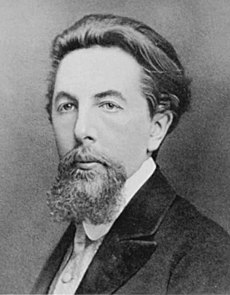Mikhail Tsvet
| Mikhail Tsvet | |
|---|---|

Mikhail Tsvet
|
|
| Born | 14 May 1872 Asti, Italy |
| Died | 26 June 1919 (age 47) |
| Nationality | Russia |
| Fields | Botany |
| Known for | Adsorption chromatography |
Mikhail Semyonovich Tsvet (Михаил Семёнович Цвет, also spelled Tsvett, Tswett, Tswet, Zwet, and Cvet) (Asti, 1872 – Voronezh, 1919) was a Russian-Italian botanist who invented adsorption chromatography. His last name is Russian for both "colour" and "flowering."
Mikhail Tsvet was born March 21st 1872 in Asti, Italy. His mother was Italian, and his father was a Russian official. His mother died soon after his birth, and he was raised in Geneva, Switzerland. He received his B.S. degree from the Department of Physics and Mathematics at the University of Geneva in 1893. However, he decided to dedicate himself to botany and received his Ph.D. degree in 1896 for his work on cell physiology. He moved to Saint Petersburg, Russia, in 1896 because his father was recalled from the foreign service. There he started to work at the Biological Laboratory of the Russian Academy of Sciences. His Geneva degrees were not recognized in Russia, and he had to earn Russian degrees. In 1897 he became a teacher of botany courses for women. In 1902 he became a laboratory assistant at the Institute of Plant Physiology of the Warsaw University in Poland. In 1903 he became an assistant professor and taught also at other Warsaw universities. After the beginning of World War I the Warsaw University of Technology was evacuated to Moscow, Russia, and in 1916 again to Gorki near Moscow. In 1917 he became a Professor of Botany and the director of the botanical gardens at the University of Tartu (Yuryev) in Estonia. In 1918 when German troops occupied the city, the university was evacuated to Voronezh, a large city in the south of Central Russia. Tsvet died of a chronic inflammation of the throat on 26 June 1919 at the age of 47.
...
Wikipedia
